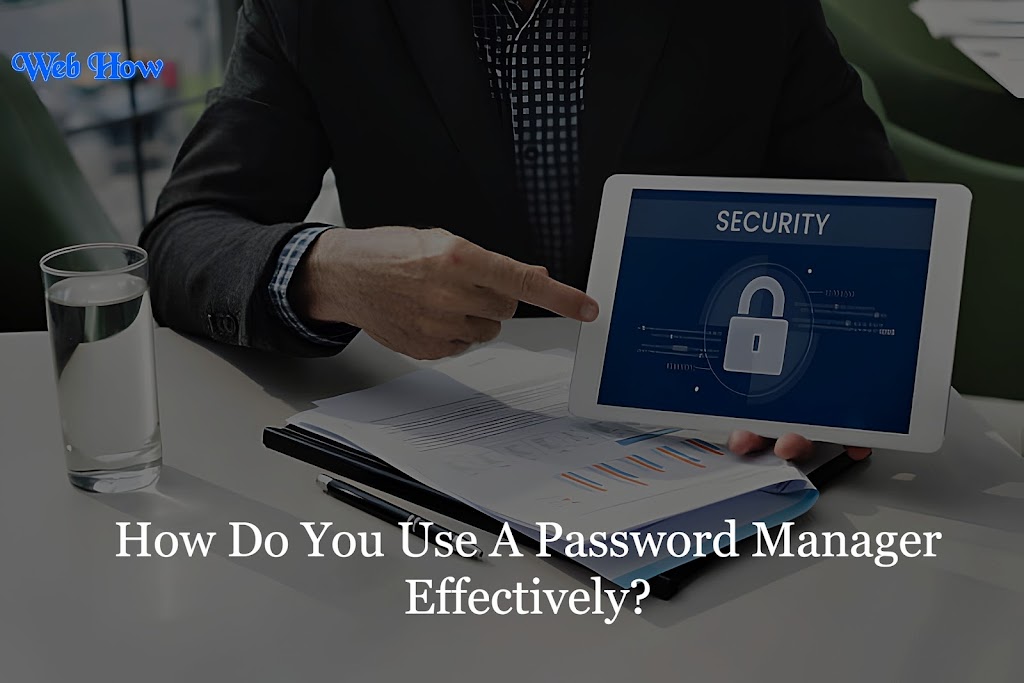How Do You Use A Password Manager Effectively?
What is a Password Manager?
A password manager is a specialized software designed to securely store and manage your passwords. It works by encrypting your passwords and other credentials and storing them in a digital vault. You only need to remember one master password to access this vault, which simplifies the process of managing multiple passwords across different platforms.
 |
| How To |
Benefits of Using a Password Manager
-
Enhanced Security: Password managers generate complex and unique passwords for each of your accounts, reducing the risk of unauthorized access due to weak or reused passwords.
-
Convenience: You don’t have to remember multiple passwords; the password manager does that for you. This saves time and effort.
-
Cross-Platform Compatibility: Most password managers work across various devices and platforms, including smartphones, tablets, and desktops, ensuring you have access to your passwords whenever you need them.
-
Encrypted Storage: Passwords are encrypted both locally and in transit, adding an extra layer of security to your data.
Getting Started with a Password Manager
-
Choose a Reliable Password Manager: There are several reputable password managers available, such as LastPass, 1Password, Dashlane, and Bitwarden. Research and choose one that suits your needs and offers robust security features.
-
Install the Password Manager: Download and install the password manager on your devices. For easy integration, the majority of password managers provide mobile apps and browser extensions.
-
Create a Master Password: Choose a strong and unique master password. Avoid using common phrases or easily guessable combinations.
-
Import Existing Passwords: If you have passwords saved in your browser or elsewhere, import them into your password manager. This consolidates all your credentials in one secure location.
Tips for Efficient Password Management
-
Generate Strong Passwords: Use the password manager’s built-in password generator to create complex passwords consisting of random characters, numbers, and symbols.
-
Organize Passwords into Categories: Group passwords by categories such as work, personal, finance, etc., for easy access and management.
-
Turn on Two-Factor Authentication (2FA): For an extra security measure, turn on two-factor authentication whenever it is feasible.
-
Regularly Update and Audit Passwords: Periodically review and update your passwords. Password managers often provide a feature to identify weak or old passwords that need changing.
-
Secure Your Master Password: Keep your master password secure and private. Don’t share it with anyone or put it in writing.
-
Use Secure Notes for Sensitive Information: Password managers often include a feature for secure notes. Use this for storing sensitive information like insurance details, WiFi passwords, and software licenses.
Best Practices for Password Management
-
Backup Your Passwords: Some password managers offer the option to back up your encrypted vault. Ensure you have a backup in case you lose access to your primary device.
-
Stay Updated: Keep your password manager updated to the latest version to benefit from security patches and new features.
-
Educate Yourself on Security Practices: Stay informed about the latest cybersecurity threats and best practices to protect your digital identity.
FAQs on How Do You Use A Password Manager Effectively?:
1. Why should I use a password manager?
A password manager offers several benefits, including enhanced security by generating and storing complex, unique passwords for each of your accounts. It also simplifies password management, saving you time and effort in remembering multiple passwords.
2. Is it safe to store my passwords in a password manager?
Yes, password managers use encryption to secure your passwords. They encrypt your data locally on your device before it’s synchronized to their servers, ensuring that even if there’s a breach, your passwords remain protected.
3. How do I choose the right password manager?
When selecting a password manager, consider factors such as security features, ease of use, cross-platform compatibility, and customer reviews. Popular options like LastPass, 1Password, and Dashlane are reputable choices to explore.
4. What is a master password, and how important is it?
A master password is the key to your password vault. It should be strong, unique, and memorable only to you. It’s crucial to keep your master password secure and private, as it grants access to all your stored passwords.
5. Can I access my passwords across different devices?
Yes, most password managers offer cross-platform compatibility. You can access your passwords from your desktop, smartphone, or tablet by logging into your password manager account.
6. How do password managers generate strong passwords?
Password managers have built-in password generators that create random and complex passwords using a combination of characters, numbers, and symbols. These passwords are highly secure and difficult to crack.
7. What happens if I forget my master password?
Unfortunately, if you forget your master password, it’s challenging to recover it due to the strong encryption used by password managers. Some managers offer account recovery options, but it’s crucial to follow their recommended security practices to avoid losing access.
8. Are password managers vulnerable to cyber attacks?
While no system is entirely immune to cyber threats, reputable password managers implement robust security measures to protect your data. Regularly updating your password manager and following best practices like enabling two-factor authentication can further enhance security.
9. How often should I update my passwords?
It’s recommended to update your passwords periodically, ideally every few months. Password managers often include features that identify weak or old passwords that need changing.
10. Can I use a password manager for more than just passwords?
Yes, password managers often include features for storing secure notes, credit card information, and other sensitive details. This makes them versatile tools for managing various types of confidential information securely.
11. Is it safe to use a password manager on shared or public computers?
It’s generally not advisable to use password managers on shared or public computers due to potential security risks. Always use password managers on devices you trust and control to minimize the risk of unauthorized access.
12. How do I back up my passwords?
Some password managers offer options to back up your encrypted vault. Check the settings or documentation of your password manager to learn how to create and maintain backups securely
Conclusion:
Using a password manager is a proactive step towards securing your online presence. By adopting good password management practices and leveraging the features of a password manager, you can significantly enhance your cybersecurity posture while enjoying convenience and peace of mind. Remember, the key to effective password management lies in strong, unique passwords and safeguarding your master password. Embrace these tips and take control of your digital security today!


